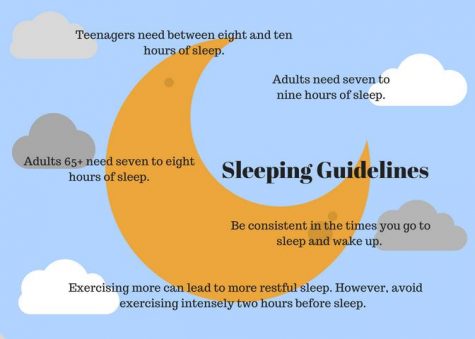Getting too much sleep can cause many complications
May 22, 2018
Between getting up early for school and staying up late the night before, less than 20 percent of high schoolers report achieving the necessary seven to nine hours of sleep per night, according to the National Sleep Foundation. With so many teenagers missing the mark for sleep, oversleeping may not seem possible to students. However, research shows that people encounter many problems when they get more than nine hours of sleep.
The University of California collaborated with the American Cancer Society in a study that showed that brain health peaked at seven hours of sleep. The six year study looked at over one million adults and found that those that slept for seven hours had the lowest death rates. The second lowest death rates were those that slept six hours, countering the initial belief that eight hours was prime for sleep.
There is also the belief that oversleeping is a symptom of depression. While most people with depression experience insomnia, Amerisleep, a mattress company, has found that 15 percent of people who have depression report oversleeping. According to the National Sleep Foundation, regularly sleeping more than 10 hours has also been a cause of more persistent and severe depression and anxiety. Aside from depression, extensive amounts of sleep can lead to cognitive deterioration. Lumosity, a brain training program, found that when people had seven hours of sleep their cognitive performance peaked, sloping downwards with more or less sleep. Healthier people tended to need less sleep and feel more well-rested after having at least seven hours.
Aside from depression, extensive amounts of sleep can lead to cognitive deterioration. Lumosity, a brain training program, found that when people had seven hours of sleep their cognitive performance peaked, sloping downwards with more or less sleep. Healthier people tended to need less sleep and feel more well-rested after having at least seven hours.
The Alzheimer’s Association International Conference held a hospital study in 1995 to 2000. It was composed of 15000 women over 70 years of age. After each two-year period, the women would have an evaluation. The researchers found that irregular sleep schedules or sleeping over seven hours worsened brain function and had an effect on early signs of Alzheimer’s. University of Cambridge researchers also found that over the course of eleven years, subjects who regularly slept for more than eight hours were 46 percent more likely to have a stroke.
Not only does excessive sleep have an effect on the brain; it has an effect on the entire body. According to the National Center for Biotechnology Information, too much time spent asleep increases inactivity and can lead to impaired glucose tolerance, where the body has trouble processing sugars. Impaired glucose tolerance is a gateway to type two diabetes and heart disease.
While sleeping more than eight hours can lead to future complications, each body is slightly different; two percent of the population are naturally long sleepers. However, if one finds themself never feeling well rested after sleeping for more than nine hours, there may be other complications.







